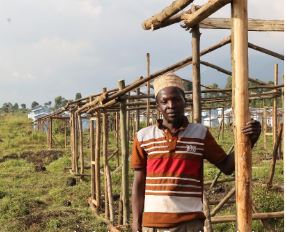DRC humanitarian crisis worsens
The conflict and humanitarian crisis in the Democratic Republic of the Congo (DRC) has worsened with the number of internally displaced people climbing to almost 7 million – the highest number so far.
With ongoing conflict and escalating violence, the DRC is facing one of the largest internal displacement and humanitarian crises in the world.
For the first time, nationwide displacement data has been collected in all 26 provinces of the country by the United Nations through International Organsation for Migration’s Displacement Tracking matrix.
The DRC has been wracked by decades of conflict, making it one of the most complex and protracted humanitarian situations in the world.
 The country accounts for over two thirds of the people the refugee agency UNHCR supports in southern Africa.
The country accounts for over two thirds of the people the refugee agency UNHCR supports in southern Africa.
In 2022, insecurity in the country was exacerbated by a spike in violence in the eastern provinces of Ituri, North Kivu and South Kivu, which displaced hundreds of thousands of people and claimed the lives of thousands more.
UNHCR and other protection agencies in the DRC recorded an average of 6,700 protection incidents per month, with a high prevalence of violence and gender-based violence. In addition, due to farming activities being disrupted by relentless conflict and continuous displacement, an estimated 26.4 million people were food insecure across the DRC, making it the most food insecure country in the world.
Conflict has been reported as the primary reason for displacement. In the eastern province of North Kivu alone, up to one million people have been displaced due the ongoing conflict between the government and the rebel group “Mouvement du 23 Mars” (M23).
More than two-thirds of the internally displaced persons, nearly 4.8 million people, live in host families.
As the security situation, particularly in North Kivu and Ituri, continues to deteriorate, movement of people is becoming more frequent and humanitarian needs are soaring.
“For decades, the Congolese people have been living through a storm of crises,” said IOM’s Fabien Sambussy.
“The most recent escalation of the conflict has uprooted more people in less time like rarely seen before. We urgently need to deliver help to those most in need,”
IOM has been actively involved in managing 78 displacement sites hosting over 280,000 internally displaced people.
Since the scale up was declared in June this year, 3,347 emergency shelters were constructed, 7,715 non-food item kits with essential supplies were distributed, and 17,116 people were supported with water, sanitation and hygiene assistance.
IOM is also enhancing mental health and psychosocial support services for site residents, facing psychological distress.
The organisation plans to support an extra 10,000 households, representing 50,000 people, in the next three months.
IOM says its operations in the DRC are significantly underfunded with less than half of the requested $US100 million received.












